Birds are fascinating creatures known for their unique behaviors and expressions. As a bird owner, it’s essential to observe and understand their body language to ensure their well-being. One common behavior that often raises concerns is when a bird repeatedly opens and closes its mouth.
While it may appear worrisome at first, there are various reasons why birds exhibit this behavior. If you’re wondering ‘Why is my bird opening and closing his mouth’, we’re here for you.
In this article, we will explore some of the potential causes behind this action and provide insights into what it could mean for your feathered friend.
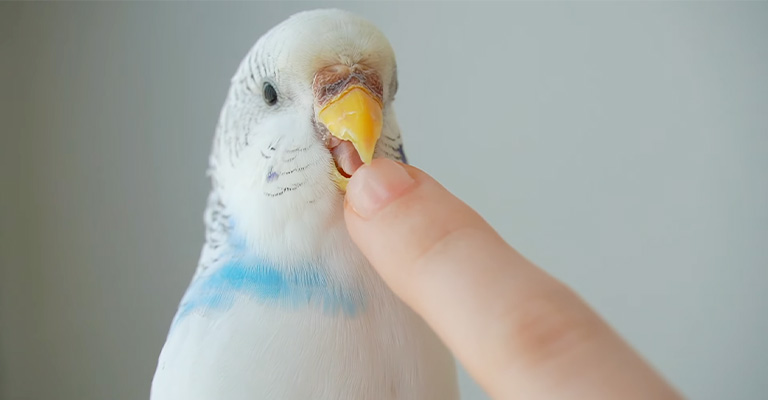
Why Is My Bird Opening and Closing His Mouth?
There could be several reasons why your bird is opening and closing its mouth. Here are a few possibilities:
Temperature Regulation
One of the primary reasons birds open and close their mouths is to regulate their body temperature. Unlike humans, birds do not have sweat glands, making it challenging for them to cool down when they are overheated.
By panting or gape breathing (opening and closing their mouths rapidly), birds can dissipate excess heat from their bodies. This behavior is particularly common in species such as pigeons, doves, and certain parrot species.
Stress or Anxiety
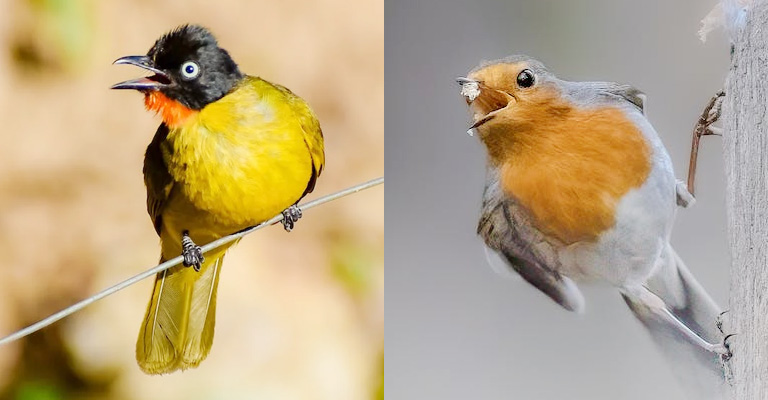
Birds are highly sensitive creatures, and stressful situations can trigger unusual behaviors. Opening and closing the mouth may be a sign of stress, fear, or anxiety in birds. It can occur when they are exposed to loud noises, unfamiliar environments, or when there are changes in their routine.
If you notice this behavior in your bird, consider assessing its surroundings and identifying any potential stressors that may be causing discomfort.
Respiratory Issues
Respiratory problems can also be a factor behind a bird’s mouth-opening behavior. Birds afflicted with respiratory infections or other ailments may struggle to breathe properly, leading to mouth movements in an attempt to increase airflow.
Watch for additional symptoms such as wheezing, coughing, nasal discharge, or labored breathing. If you suspect a respiratory issue, consult a veterinarian who specializes in avian care for a thorough examination and appropriate treatment.
Excitement or Anticipation
In some cases, birds may open and close their mouths as a response to excitement or anticipation. This behavior is often observed when they are expecting food, or treats, or during playtime. It is their way of expressing enthusiasm and eagerness.
While this behavior is generally harmless, it is crucial to ensure a balanced and nutritious diet for your bird to prevent any potential overexcitement related to feeding time.
Beak or Dental Problems
A bird’s beak is a vital tool for various activities, including eating, climbing, grooming, and playing. If a bird is experiencing discomfort in its beak or oral cavity, it may exhibit mouth-opening behavior. Dental issues, such as overgrown beaks, malocclusion, or dental infections, can cause pain and difficulty in normal beak movements.
Regular beak maintenance, including proper diet and chew toys, can help prevent such problems. If you suspect any beak or dental abnormalities, consult an avian veterinarian for a thorough examination.
Why Does My Bird Keep Stretching His Neck And Opening His Mouth?
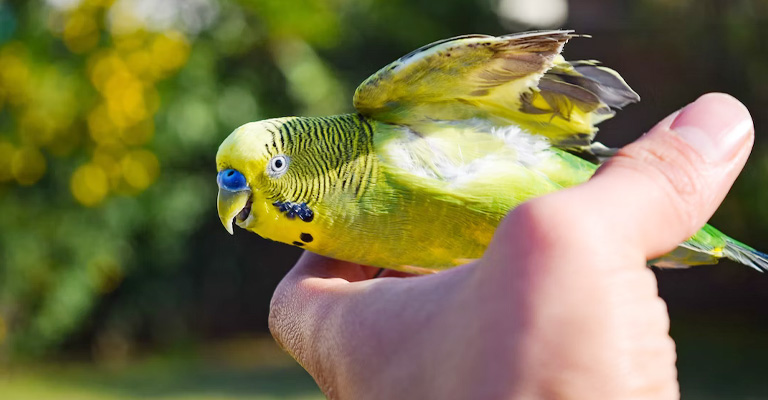
If your bird is frequently stretching its neck and opening its mouth, it may indicate a few possible reasons:
Vocalization and Communication
Birds often use stretching their neck and opening their mouth as part of their vocalization repertoire. It can be a way for them to communicate, express excitement, or call out to other birds. Some species have unique vocalizations that involve stretching the neck and opening the mouth, such as cockatoos or macaws.
Displaying Dominance or Territory
Certain bird species may engage in stretching their neck and opening their mouth as a display of dominance or territorial behavior. This can be seen in parrots, especially males when they are trying to establish their dominance over others or protect their territory.
Physical Comfort
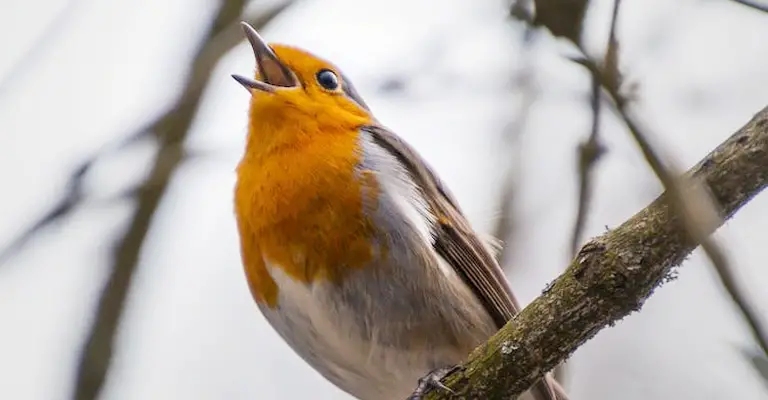
Stretching the neck and opening the mouth can also be a sign of physical comfort. Birds may do this to relieve tension in their muscles or adjust their posture. It is akin to humans stretching their arms or legs after sitting for a long time.
Respiratory Issues
In some cases, repetitive stretching of the neck and opening the mouth can indicate respiratory problems in birds. If your bird is also displaying other symptoms like wheezing, coughing, nasal discharge, or labored breathing, it is crucial to consult an avian veterinarian for a thorough examination and appropriate treatment.
Environmental Stimulation
Birds are curious and intelligent creatures, and they may engage in stretching their neck and opening their mouth as a response to environmental stimulation. It could be a reaction to something they see, hear, or even a new object in their surroundings that piques their interest.
While occasional neck stretching and mouth opening is typically normal, it’s important to pay attention to the frequency, duration, and any accompanying symptoms or changes in behavior.
If you have concerns about your bird’s behavior or suspect underlying health issues, it is always recommended to consult an avian veterinarian for proper evaluation and guidance.
What Does It Mean When A Bird Is Gasping?
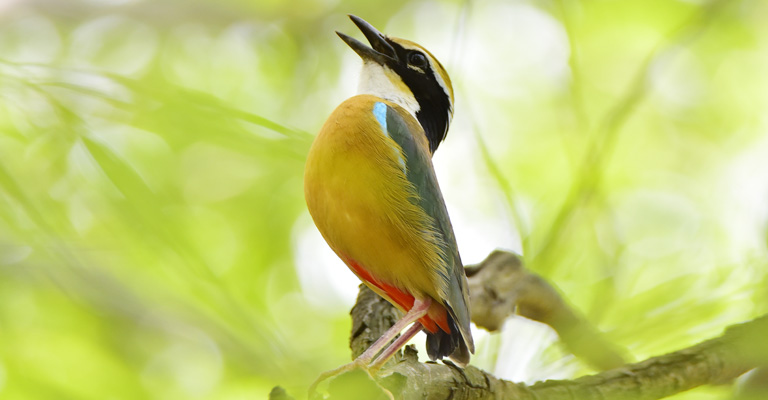
When a bird is gasping, it is typically a sign of respiratory distress or difficulty breathing. Gasping in birds is a serious symptom that requires immediate attention. It may indicate an underlying respiratory infection, blockage of the airway, heart problems, or other critical health issues.
Here are some potential causes of gasping in birds:
Respiratory Infection
Birds can develop respiratory infections caused by bacteria, viruses, or fungi. Common respiratory infections in birds include avian influenza, psittacosis, or aspergillosis. These infections can lead to inflammation, congestion, and breathing difficulties.
Airway Obstruction
An obstruction in the bird’s airway, such as a foreign object or an internal growth, can cause gasping. This can occur if the bird accidentally ingests something that gets lodged in its throat or air passage.
Heart or Cardiovascular Problems
Birds can experience heart conditions, such as congestive heart failure, which can lead to fluid buildup in the lungs and respiratory distress.
Allergic Reactions
Birds can have allergic reactions to environmental factors like dust, pollen, or certain types of food. These allergic responses can cause breathing difficulties and gasping.
Environmental Factors
Poor air quality, exposure to harmful fumes or toxins, or extremely high or low temperatures can also cause respiratory distress in birds.
If you observe your bird gasping, it is crucial to seek immediate veterinary care from an avian veterinarian. They will conduct a thorough examination, including diagnostic tests like blood work, X-rays, or endoscopy, to determine the underlying cause.
Treatment will depend on the specific diagnosis but may include antibiotics, anti-inflammatory medications, supportive care, or surgical intervention if necessary.
Remember, gasping in birds is a serious symptom that should not be ignored. Quick intervention and proper veterinary care are essential for improving the bird’s chances of recovery.
Is There an Easy Solution?
Addressing a bird’s behavior of opening and closing its mouth depends on the underlying cause. In some cases, the behavior may be normal and not a cause for concern.
However, if you suspect that the behavior is due to stress, respiratory issues, or any other health problem, here are some steps you can take:
Assess the Environment
Ensure that your bird’s living space provides a comfortable and stress-free environment. Reduce loud noises, avoid sudden changes in routine, and provide plenty of mental and physical stimulation through toys and interactive play.
Temperature Regulation
If you suspect your bird is opening its mouth to regulate its body temperature, make sure the environment is at an appropriate temperature for the species. Avoid exposing your bird to extreme heat or cold, and provide access to fresh air and shade if it’s outdoors.
Dietary Considerations
Offer your bird a well-balanced and nutritious diet appropriate for its species. A healthy diet can support your bird’s overall well-being and help prevent potential health issues.
Consult an Avian Veterinarian
If you notice any other concerning symptoms or changes in your bird’s behavior, it’s essential to seek professional advice from an avian veterinarian. They can conduct a thorough examination and provide a proper diagnosis and treatment plan if necessary.
Address Respiratory Issues
If you suspect respiratory issues, take your bird to an avian veterinarian immediately. Prompt diagnosis and treatment are crucial for respiratory problems to avoid potential complications.
Observe for Improvement
After making any necessary adjustments based on the above steps, closely monitor your bird’s behavior. If the mouth-opening behavior persists or worsens, consult with a veterinarian for further evaluation.
Always remember that each bird is unique, and the solution may vary depending on the individual bird’s health, species, and environmental factors. Regular veterinary check-ups and maintaining a positive and enriching environment are key to promoting your bird’s well-being and happiness.
FAQs
Yes, it can be normal for birds to open and close their mouths on occasion. As mentioned in the article, birds use this behavior for temperature regulation, stress relief, excitement, or anticipation.
However, if you notice excessive or persistent mouth opening, along with other concerning symptoms, it is advisable to consult a veterinarian for a thorough examination.
Stress or anxiety can manifest in different ways in birds. Along with mouth-opening, other signs of stress may include feather plucking, loss of appetite, excessive vocalization, pacing, or aggressive behavior. If you suspect stress or anxiety as the underlying cause, try to identify and minimize potential stressors in your bird’s environment.
Providing a calm and secure atmosphere, along with engaging activities and positive reinforcement, can help alleviate stress in your feathered companion.
Respiratory issues can be serious and require prompt attention. If you notice mouth opening accompanied by symptoms such as wheezing, coughing, nasal discharge, or labored breathing, it is important to consult an avian veterinarian.
They will conduct a thorough examination, possibly including diagnostic tests, to determine the underlying cause and recommend appropriate treatment. Early detection and intervention are key to ensuring the well-being of your bird.
Yes, a bird’s diet plays a significant role in its overall health and behavior. Nutritional deficiencies or imbalances can contribute to various health issues, including beak problems and weakened immune systems.
Providing a well-balanced diet that includes a variety of fresh fruits, vegetables, grains, and high-quality bird pellets can help maintain your bird’s overall health. Consult an avian veterinarian or an avian nutritionist for guidance on a suitable diet for your specific bird species.
Maintaining proper beak health is essential for birds. Some preventive measures include providing your bird with appropriate chew toys to help keep the beak properly worn down and exercised. Ensuring a balanced diet with appropriate texture and hardness can also contribute to good beak health.
Regular veterinary check-ups are crucial to detect any potential beak or dental abnormalities early on. A veterinarian with expertise in avian care can guide you on specific measures to prevent beak problems based on your bird’s species and individual needs.
Final Words
Here, we’ve answered why is my bird opening and closing his mouth. Understanding avian behavior is crucial for bird owners to provide appropriate care and address any potential health concerns. While the behavior of opening and closing the mouth can be alarming, it is often a normal response to various stimuli.
By considering factors such as temperature regulation, stress, respiratory issues, excitement, or beak problems, you can better assess your bird’s situation and take appropriate action when necessary.
Remember, if you have any concerns about your bird’s health or behavior, it is always best to consult a qualified avian veterinarian for professional guidance.